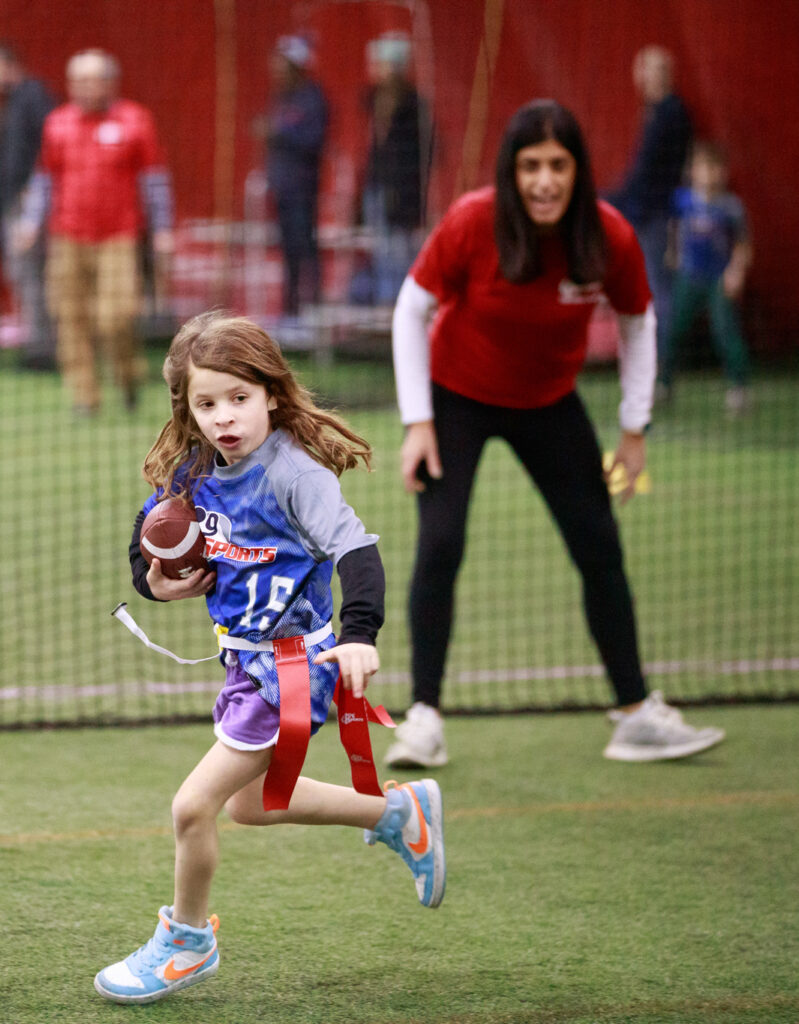From The Generations of Girls That Missed Out On Flag Football
From the addition to the 2028 Olympics, to being recommending as an emerging NCAA sport for women and becoming an official high school sport in 15 states across the nation, flag football is gaining traction and popularity on a national scale. As a female athlete of generations past, I have one thing to say— I am jealous, but deeply grateful!
Here is what the female athletes of previous generations want the female athletes of today to know:
Girls Playing Football? We Were Told, “Absolutely Not”
Female athletes across the globe are constantly striving to make the world better for those that come after us, especially the world of athletics. It’s our hope that the generations after us have more doors open, more opportunities, and less stereotypes to stop them. Flag football is currently a substantial vector for delivering these new opportunities.
Watching the world of sports go through a massive culture shift with women’s sports like women’s basketball, softball, and flag football is a glimmer of hope for those of us that played in a different, less accepting era of women’s sports.
Prior to the mass adoption of flag football, it was nearly impossible for a girl to play football. They could go to the games, watch football on TV, even cheer on the sidelines, but a girl actually play football? Unheard of.
Instead, we heard:
- Football is a man’s game.
- Girls don’t belong in football.
- It’s too rough, you’re too fragile.
- You’ll get hurt.
- You could be a cheerleader?
These beliefs, among many other similar stereotypes have stopped girls from playing sports for decades. It’s not the first time females have had to prove themselves in sports and break the barriers set by society.
A Quick History on Women’s Sports
Sports were just for men until the last 60 years. Originally, people (including women themselves) didn’t know women were physically capable of running long distances or other athletic feats done by men. Women were scared to try it for fear of injury or death. According to author Katie Barnes in her book Fair Play: How Sports Shape The Gender Debates, the first official woman to enter a man’s sport was in 1967 when Kathrine Switzer entered the Boston Marathon. Bobbi Gibb was the first female to run the race unofficially the year prior as her registration was rejected because “women were not physiologically capable of running twenty-six miles,” according to race director Will Cloney.
In 1967, Switzer managed to slip by in the registration process. Race officials tried to physically remove Switzer from the course once they discovered she was a woman. She knew if she didn’t finish the race, it would be said that women don’t belong in sports, “I knew if I quit, nobody would ever believe that women had the capability to run twenty-six plus miles.” So, she fought through the physical attacks and finished the race. After her successful completion of the Boston Marathon, women were formally banned until a women’s version of the race was created in 1972.
Title IX and Beyond
Title IX was passed in 1972, but women’s sports didn’t become normalized until 10 years later. According to Barnes’ book, the now well-known NCAA fought legal battles in order to not acknowledge women’s sports. Instead, women’s championships were hosted by the Association of Intercollegiate Athletics for Women (AIAW). Eventually the NCAA caved and adopted women’s championships in the 1981-1982 school year after essentially forcing the closure of the AIAW. And now, we have the NCAA men’s and women’s sports that we know today.
Collegiate and professional female athletes continue the fight for equality in sports today. Examples include the US National Women’s Soccer Team’s fight for equal pay and college basketball player, Sedona Prince, showcasing the difference in Women’s March Madness fitness equipment compared to Men’s March Madness fitness equipment in 2021. Prince’s original TikTok video opened the floodgates and lead to legal action in regards to earning power of athletes as well as increased sponsorships that have brought women’s basketball into its new era of popularity.
Fast-forward to today—flag football has quickly become the latest vector for change in women’s sports. Flag football has become the wrecking ball girls needed to shatter the glass ceiling and breakthrough the old narratives surrounding the sport of football. For the first time, people are seeing on a large scale that girls can play football. It may not be traditional football, but it requires similar strength, speed, power, and agility, and it’s opening more possibilities for women in sports.
When We Wanted to Play Football, It Wasn’t an Option
I’ve watched football with my dad since I was 3-years-old. When I started playing sports, I begged to play football. I would run routes in the yard with him, but there was no way my dad would ever let me try out for a football team. Not because he didn’t support me, but because the idea of a girl playing football was laughable back then.
He played football, he knew firsthand how aggressive it could be, so he and the rest of society felt that a football field was a dangerous place for girls. In his eyes, my bones would shatter just walking onto the field.
Though this may be a personal anecdote, I am one of many young girls who watched football with her dad, and didn’t understand why she wasn’t allowed to play with the boys. Alternative options like flag football didn’t exist yet, so most of us went on to choose another sport that girls were more welcomed in at the time.
What if flag football was an option back then? Would he have let me play? I think he would. He thinks he would. I did get to play in our “Powderpuff” fundraiser game my junior and senior year of high school. That was the first time flag football ever made its way into schools in my area for girls or boys. Now, over a decade later, the sport is becoming mainstream and not just “Powderpuff.”
(Let the record show, you don’t have to give it a fluffy name for girls to want to play. We don’t need everything to be pink, sparkly, and fluffy; that’s a stereotype).
The Message The Generations of Girls Before You Didn’t Get, But We’re Sending You
Many of us never got the chance to play a sport we loved because “it was for boys.”
But you can. And you should.
Flag football may be the sport that pushes female athletes into a new realm of opportunity. Every few years, there is an athlete or a sport that breaks through—this is it.
You don’t need prior experience. You don’t need to know every play or every rule. If you have any interest at all, give it a try. You may find a new passion! You may become part of a movement that leads to new opportunities for you and the girls after you.
To the hesitant parents— flag football is opening doors; let your daughters walk through them if that’s where their interests lead them! Let them blaze this trail and open new doors for themselves and generations after them.
I think I can speak for most of us in the older generations when I say:
Break the barriers, shatter the old narratives.
Do it for those that couldn’t before you.
Do it for those waiting to follow in your footsteps.
Now is the time to show them we can throw a spiral down field, we can dodge a “tackle,” and we can recognize a zone defense a mile away.
Show them we belong; show them YOU belong.
You’re not just playing flag football.
You’re rewriting history.
We may be the generation that missed out on flag football, but we’re cheering loudly for yours!
Find Your Local Girls’ Flag Football Programs
i9 Sports® offers co-ed flag football, girls’ flag football teams, and girls’ flag football leagues in many cities across the United States. Our programs are designed to grow with your athletes from their rookie season to their final trophy. Our flag football programs for girls build character and leadership skills as well as skill development with our unique focus on sportsmanship.
We provide our coaches with professional resources, practice plans, and courses on how to improve coaching for female athletes. If the young girls in your family are ready to play flag football, we have options to fit all skill levels!
About the Author

Ashly Colicchio
National Marketing and Communications Manager, i9 Sports®
Ashly holds a Bachelor of Science in Sport and Exercise Science and a Minor in Communications with a certification of Coaching from the University of Central Florida. Ashly specialized in strength and conditioning where prior to her career in marketing, she was a certified personal trainer with a focus in youth athlete performance. A former softball player for over 15 years, Ashly has also dedicated several years to coaching youth softball for ages 4–10, using evidence-based training methods to foster athletic development, deepen game comprehension, and ignite a passion for the sport in young aspiring athletes.
Transitioning her expertise into the marketing world, Ashly has spent over a decade crafting strategies across diverse industries, including collegiate and professional sports, sports medicine, hospitality, and public service. Her unique ability to translate coaching principles into marketing leadership has allowed her to successfully train business professionals in marketing best practices.
As a marketing professional at i9 Sports®, Ashly is passionate about empowering youth athletes and their parents, ensuring they have the tools and resources to succeed both on and off the field. Her deep knowledge of sports science and athletic development serves as the foundation for the compelling sports content she produces for i9 Sports® and other industry platforms.
